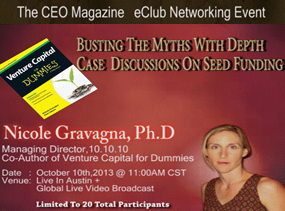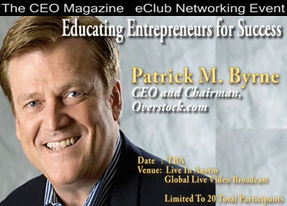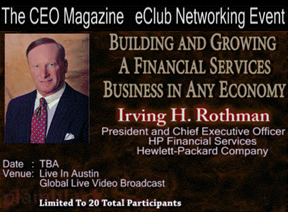You are here
- Guest Blogger |
- Small Business - Finance - Entrepreneurship |
- Tue, 01/14/2014 - 21:47

Judd Hollas, Founder & Chief Inventor, EquityNet
Just some years ago the term “crowdfunding” was a foreign concept to many people who didn’t understand this new and alternative way to access capital. However, today the word has now become a part of the everyday business vernacular. In fact, businesses last year raised more than 5.1 billion dollars worldwide using this practice.
The crowdfunding frenzy doesn’t appear to be slowing down anytime soon, especially since more legislation has been enacted, further solidifying the status of equity crowdfunding (ECF). This will motivate even more entrepreneurs to take fundraising into their own hands instead of reaching out to venture capitalists and lending institutions. Last September, we saw Title II of the US JOBS Act enacted into law, giving entrepreneurs the opportunity to publicly advertise their need for funding. This law has provided entrepreneurs with a much larger pool of investors to reach out to and will ultimately increase their odds of reaching their funding goals. In addition, Title III of the JOBS Act is currently under review by the SEC. However, when it becomes ratified this year, it will allow non-accredited investors to become active in ECF, thereby increasing the investor pool that much further.
Even though we are still waiting for the JOBS Act to be enacted in its entirety, we can still expect the ECF industry to experience substantial growth. Major occurrences are anticipated to emerge throughout this year, and the top five 2014 predictions are listed below.
1) Up to $1 billion in equity transactions will occur worldwide in 2014 based on industry trends from the past two years.
The 2013 crowdfunding report by Massolution stated that around $5.1 billion in transactions occurred globally in 2013. That’s around a 100 percent increase from 2012 when $2.6 billion was raised. The report also stated that $204 million was from ECF. Assuming that the global crowdfunding market will again experience a 100 percent growth rate next year and regulations will allow for more people to participate in ECF, ECF could produce between $500 million to $1 billion transactions in 2014. This is especially true as more investors realize the potential ROI in ECF.
2) Equity crowdfunding will become a global phenomenon as countries seek to implement it to maintain their economic competitiveness.
In some countries such as the United Kingdom, Finland, Australia, and Italy, ECF is already legal. The United States is also well on its way to legalizing ECF by adopting Title III of the JOBS Act. This law will allow almost any investor to participate in ECF sometime next year. Global participation in ECF is imminent as more countries develop laws to deal with the legal matters revolving around ECF.
A new report produced by Richard Schwartz for the World Bank states that the annual total market potential of the entire crowdfunding industry could reach $300 billion by 2025. China’s potential could reach $47.6 billion, while Europe and central Asia could reach $13.8 billion.
3) Large financial institutions will make their foray into ECF for the first time as the industry becomes more established.
As ECF continues to scale, financial institutions such as large broker/dealers, online brokerage firms, and private equity groups will expand their services into the crowdfunding industry. As stated in our first point, the global crowdfunding market has the potential to double in size by the end of this year, and ECF could account for $1 billion in transactions. Large financial institutions will likely begin to offer ECF services to capitalize on the enormous growth rate of the crowdfunding industry as a whole. Their appearance in the ECF industry could also bolster the number of transactions due to brand recognition and consumer loyalty.
4) In North America, more than half of companies using equity crowdfunding platforms will use the new Title II rule to advertise their need for funding.
Title II of the JOBS Act was introduced earlier this year on September 23, 2013. It lifted the 80-year-old ban on general solicitation, allowing business owners to publicly advertise their need for funding. According to EquityNet’s data, about half of the new companies listed on the site are utilizing Title II to reach a broader audience of investors. More entrepreneurs will likely begin to adopt this rule in 2014.
5) The implementation of Title III will not cause the calamity its skeptics say it will.
The United Kingdom and Australia have both allowed non-accredited investors to participate in ECF for quite some time now. The successes of the members of those countries’ ECF communities should be indicative of what we can expect in the US. At worst, entrepreneurs who utilize Title III will have to comply with additional federal regulations and a limit as to how much they can raise. If the SEC can establish rules that mitigate the cost of compliance, then ECF could soon become the most popular form of crowdfunding by the end of this year.
About the Author
Judd Hollas is the founder and chief inventor of EquityNet., which has raised over $210 million in equity crowdfunding and which holds 3 crowdfunding technology patents. EquityNet was one of the first Title II crowdfunding platforms for accredited investors and will soon be adding Title III non-accredited investor capabilities to the site. Judd has more than 20 years of experience as an independent technology analyst and investment manager in the private and public domains.
Comments
Follow The Blog
Blog Categories
- Business Ops. (45)
- Editors (3)
- Entrepreneurship (196)
- Finance (25)
- Leadership (529)
Blog Authors
- Guest Blogger (835)
- Cynthia Kay (92)
- Linda Henman (78)
- Dianna Booher (46)
- Craig Ross (31)














